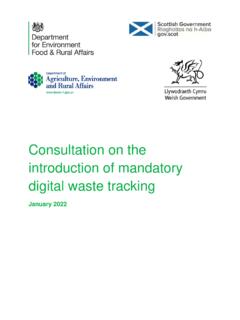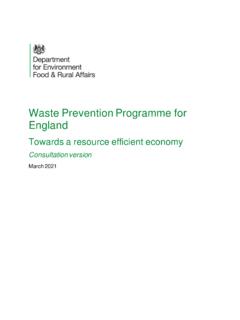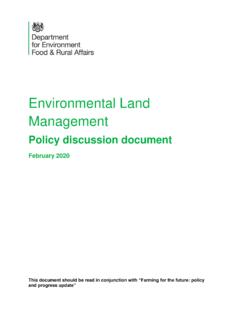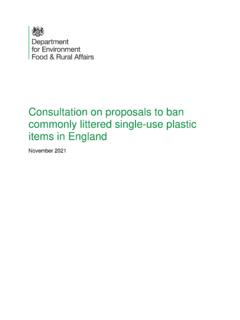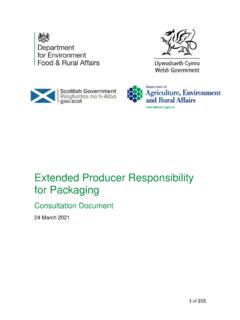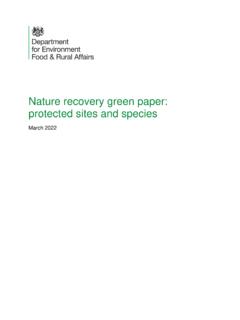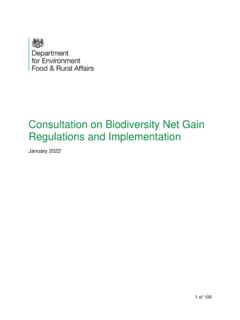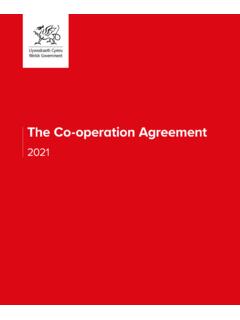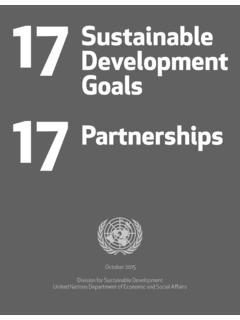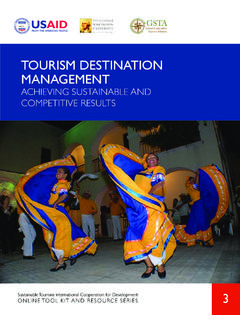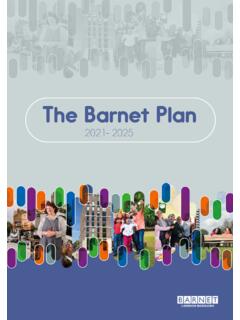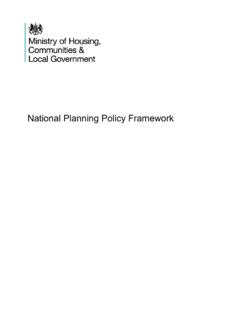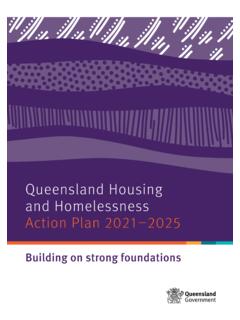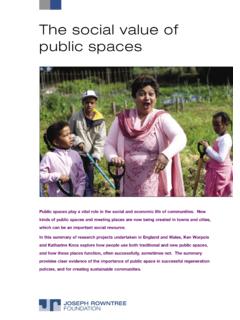Transcription of Consultation on the draft Joint Fisheries Statement
1 Consultation on the draft Joint Fisheries Statement Date: January 2022. Page 1 of 82. Crown copyright 2022. This information is licensed under the Open Government Licence To view this licence, visit This publication is available at legislation-team/jfs/. Any enquiries regarding this publication should be sent to us at: 2 of 82. Contents Introduction ..6. Purpose of the Summary of this How this JFS was Developed ..8. How to Respond to this Consultation ..9. Duration of the Consultation ..9. Confidentiality and Data Protection information ..9. Consultation Questions ..11. Enquiries ..11. ANNEX 1: Consultation draft of the Joint Fisheries Statement ..12. Executive Summary ..16. Why a JFS? .. 16. Why is fishing important? .. 16. What policies are in the JFS? .. 16. Why Fisheries Management Plans? .. 17. How will we evaluate progress? .. 17. Introduction ..18. Importance of fishing to all nations in the UK .. 19. The UK Fisheries Management and Support Framework.
2 19. National and International Agreements .. 20. Northern Ireland Protocol .. 20. The Scope of the JFS .. 20. Effect of the JFS and FMPs .. 21. Accountability .. 21. 1. Our Shared Ambition ..22. 3 of 82. 2. The Fisheries Objectives ..23. Interpreting the Objectives ..23. Applying the Objectives ..27. Objectives by Policy Areas ..28. 3 Delivering the JFS ..30. Principles ..30. Science and Evidence ..31. Reporting and Review Process ..33. Monitoring ..34. Working in Partnership ..34. Participatory Decision Making ..34. 4 Delivering sustainable Management of Fisheries ..35. Our approach to Fisheries Management ..35. Achieving the Fisheries Objectives through our Policies ..38. Fishing Opportunities .. 38. Non-quota Stocks .. 43. Wider International Engagement .. 44. Fishing Capacity .. 44. Approach to access to UK waters .. 45. Illegal, Unreported, and Unregulated Fishing .. 45. Reducing Bycatch and Minimising Catches of Sensitive Species.
3 45. 46. Marine Spatial 46. Marine Protected Areas .. 47. Marine Litter .. 47. Coastal and Freshwater .. 47. Climate Change .. 48. Aquaculture .. 49. 4 of 82. Recreational Sea Fishing .. 50. Production, Marketing and Consumption of Seafood .. 50. 5. Fisheries Management Plans ..52. Introduction ..52. What is a Fisheries Management Plan? ..53. Determining the stocks included in FMPs ..54. How FMPs relate to Fisheries Objectives? ..55. Relationship between FMPs and Existing Management Plans ..56. Assessing sustainable Limits ..56. Monitoring and Review of FMPs ..56. Annex A: List of proposed FMPs ..58. Annex B: Glossary ..63. ANNEX 2: JFS Consultation Response Form ..69. ANNEX 3: JFS Narrative Impact Assessment ..70. 5 of 82. Introduction Marine Fisheries are of great importance to the United Kingdom our seafood sectors generate food, jobs, culture, and a strong sense of identity and pride for their communities . The stocks of fish on which they are based support recreational uses and contribute significantly to the healthy functioning of our marine ecosystems.
4 Now the UK has left the European Union, we wish to outline our plans to pursue sustainable Fisheries policies that are tailored to the needs of our industry and our marine environment. The Fisheries Act 2020 (the Act) enshrines in law our commitment to sustainable fishing, supporting future generations of fishers while allowing our marine environment to thrive. It provides a legally binding structure to protect and recover stocks, support a sustainable fishing industry, and safeguard the environment. Included within the Act is a set of Fisheries objectives that set the UK's strategic direction for delivering sustainable Fisheries management. The Fisheries policy authorities within the UK are required to develop a Joint Fisheries Statement (JFS), to set out our policies for achieving, or contributing to the achievement of, the objectives. The UK Government, Northern Ireland Executive, Scottish Government, and Welsh Government have a history of productively working together on Fisheries management to define and achieve the UK's vision for clean, healthy, safe, productive, and biologically diverse oceans and seas.
5 We have jointly prepared this first JFS for Consultation and welcome the opportunity to set out our policies and the steps we are taking together to deliver our shared ambition for sustainable Fisheries . Fisheries management in the UK is largely devolved. As part of the wider UK Fisheries Management and Support Framework (the Fisheries Framework), the JFS provides a mechanism to manage policy divergence while establishing common goals for all administrations to work towards. As a responsible coastal State, the JFS sets our policy framework for how we will work with international partners to ensure the long-term sustainable management of the Fisheries resources we share. Through the JFS and the policies and management measures which will flow from it, the UK Fisheries policy authorities will together deliver a prosperous fishing industry for future generations while safeguarding, restoring, and enhancing the marine environment on which the industry and wider society depends.
6 This Consultation document invites your views on the draft JFS. The draft has been shaped by comments we received in spring and summer 2021 from a wide range of interested parties via a UK-wide Community of Interest (CoI) stakeholder group. The draft JFS has also been laid in accordance with paragraph 3(1) of Part 1 of Schedule 1 of the Act in the UK Parliament, Scottish Parliament, Senedd Cymru and Northern Ireland Assembly, which each may pass a resolution or make a recommendation regarding the draft document. A Fisheries policy authority must then lay a Statement before the relevant legislature setting out its response. 6 of 82. The deadline for responses to this Consultation document is 12 April 2022. Purpose of the Consultation This Consultation seeks views on the draft JFS listed in ANNEX 1 of this document. It is being carried out in accordance with paragraph 2 of Part 1 of Schedule 1 of the Act. We recognise the importance of engaging with stakeholders to ensure the JFS is fit for purpose and are keen to hear from any persons interested in, or affected by, the policies contained in the JFS, and members of the public.
7 This Consultation has particular relevance to: Individuals, groups or businesses who are engaged in the fishing, seafood, or aquaculture sectors;. Other individuals, groups or businesses who are sea users, for example, marine industries such as oil and gas, offshore renewables and sailing bodies; and National and local interest groups such as environmental and recreational non- governmental organisations, and industry federations. Summary of this JFS. This JFS includes policies for achieving, or contributing to the achievement of, the Fisheries objectives, as required by the Act. In addition, it includes a Statement explaining the intended use of Fisheries Management Plans (FMPs) by the Fisheries policy authorities to achieve, or contribute to achieving, the Fisheries objectives, and a Statement on how the Fisheries objectives have been interpreted and proportionately applied in formulating the policies and proposals.
8 This JFS has been drafted in accordance with the principles within the Fisheries Framework Memorandum of Understanding. The JFS includes the following chapters: The Introduction chapter explains what the JFS is and provides a background to the document. It explains why the JFS has been developed and how it fits in to the wider Fisheries Framework, as well as the scope of the JFS and the requirement of all Fisheries policy authorities to act in accordance with the policies in the JFS. Chapter 1: Our shared ambition outlines the UK's shared ambition to deliver world class, sustainable management of our Fisheries and aquaculture, focusing on the three main themes of: Protecting and, where necessary, recovering our fish stocks;. Reducing the effects of fishing on the marine and coastal environment; and 7 of 82. Supporting a modern, resilient, and environmentally responsible fishing industry. Chapter 2: The Fisheries Objectives contains a list of all the Fisheries objectives, and how they are interpreted in the JFS.
9 It also contains a Statement explaining how the Fisheries objectives have been applied when formulating the policies contained in the JFS, followed by a tabular summary of policy areas by each objective. Chapter 3: Delivering the JFS outlines how the policies in the JFS will be delivered by the national Fisheries authorities through the exercise of their functions and in line with the Fisheries objectives. The following principles will underpin the delivery of the JFS: Good science and a robust evidence base to inform policy and management decisions;. Working in partnership across the four Fisheries policy authorities, and with stakeholders, other coastal States and international partners to deliver effective Fisheries management; and Participatory decision making to provide the seafood and marine sectors, Non- Government Organisations (NGOs) and coastal communities with a voice in the decisions that will impact them.
10 An overview of the reporting and review process and monitoring is also included in this chapter. Chapter 4: Delivering sustainable management of Fisheries sets out how the JFS will deliver the sustainable management of Fisheries . It outlines the approach to Fisheries management and sets out policies for achieving, or contributing to the achievement of, the Fisheries objectives. Chapter 5: Fisheries Management Plans explains the use the Fisheries policy authorities propose to make of FMPs in order to achieve, or contribute to the achievement of, the Fisheries objectives. This chapter also describes the relationship between existing retained EU Multi-Annual Plans (MAPs) and FMPs. Included in Annex A of the JFS is a list of proposed FMPs. How this JFS was Developed The JFS has been developed jointly by the Fisheries policy authorities. Alongside the drafting process, stakeholders have been engaged via the CoI. The CoI has a wide membership with representatives from across the sector to maximise input and ensure breadth of expertise.
